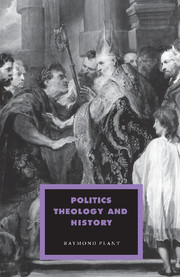Book contents
1 - Liberal society and political theology
Published online by Cambridge University Press: 23 November 2009
Summary
A Christian Sociology recognises that there are objective social relationships which can be judged better or worse from a doctrinal Christian standpoint. The Church historically and actually has something to say about the nature of government, the liberty of the person, economic justice and the right distribution of property. The key word of this sociological question for the Christian is justitia, which transcends questions of personal attitudes and connotes a ‘rightness’ in political economic and other social relationships themselves for the Christian faith to proclaim.
(V. A. Demant, Christian Polity)And the world which seems
To lie before us like a land of dreams,
So various, so beautiful, so new
Hath really neither joy, nor love nor light,
Nor certitude, nor peace, no help for pain;
And we are here as on a darkling plain
Swept with confused alarms of struggle and flight,
Where ignorant armies clash by night.
(M. Arnold, Dover Beach)My aim in this book is to consider two themes which can be kept separate, but which I shall interrelate. The first theme is the nature, scope and, more radically, the possibility of political theology, by which I mean the possibility of relating Christian beliefs in a coherent and rigorous way to the problems of social, economic and political organisation. The second set of issues has to do with the moral foundations, if any, on which modern democratic liberal societies in the West rest.
- Type
- Chapter
- Information
- Politics, Theology and History , pp. 1 - 22Publisher: Cambridge University PressPrint publication year: 2001



